Premillennial Eschatology
by Bruce Daugherty
In the summer of 1915, it was announced in the Christian Leader that R. H. Boll would become a regular contributor to the paper. Ira Moore’s welcome to Boll in his editorial column was enthusiastic but cautionary: "Surely all those brethren who were previously acquainted with the writings of Bro. R. H. Boll on practical matters will be glad of his association with the Christian Leader. There is no more elegant and graceful writer among us than Bro. Boll, and what he says upon practical matters is always interesting and helpful. . . . We may not all agree with him when he strikes the book of Revelation, but even then he is interesting and entertaining, though he may be in error." (Moore, Brevities, 8). Boll’s association with the Leader was short lived as he briefly returned to the Gospel Advocate, then began writing for Word and Work.
This study will examine two articles appearing in the Christian Leader articulating Boll’s rationale for prophetic studies and their importance to Christianity. It then will examine articles from the six Leader editors regarding premillennial eschatology, and articles from the six addressing the bearing of liberty of opinion to fellowship questions as displayed in the premillennial discussion. More than 225 articles dealing with this issue appeared in the Leader. The articles come in 3 phases: 1)Early period (1914-1922) in which mild to serious debate is engaged with Boll, Charles Neal, and others even as Boll was welcomed to the Leader. 2)Middle period (1923-1931), the debate in the Leader becomes one sided as the articles are nearly unanimous in opposing the various features of premillennialism but apologists defended Boll's liberty of opinion. 3)Late period (1932-1938), opposition to premillennialism is intensified by the entry of Foy E. Wallace, jr. Open calls for disfellowship of Boll and others are pursued, as premillennialism is denounced as false, divisive and digressive in nature.
In an article published in the Leader, Boll explained his view of the place and importance of studying the prophets. Were prophetic matters - questions about the kingdom, the millennial reign - essential? Boll said this was not just a simple “yes or no” answer. "They are not essential in the same sense as faith, repentance, and baptism. No one would, I think, claim that an understanding of the prophecies is a condition and prerequisite of entering the “Ark of Safety,” of getting “into Christ.”" (Boll, Prophetic, 1). As well as not being essential to conversion, Boll also said that they were not essential to fellowship in Christ. Differing views on the prophecies should have no effect on the work and worship of the saints. “It is therefore, clearly not fundamental and essential in the absolute sense of the word.” (Ibid.). But because of this statement, Boll said there were some who would conclude that the prophecies were “un-important things and matters of indifference.” Such a conclusion was mistaken. Boll pointed out that there were many things one could do without, but that didn’t make those items superfluous. Why were prophetic studies important, if Boll said they were not essential? "First of all, every scripture, prophecy not excepted, is profitable. This much we know. It is further evident that any part of scripture, and any scripture theme, is a fit theme for investigation and brotherly discussion that we may all learn and be edified." (Ibid.). To make a hobby of a scripture or to ignore it were two extremes that were to be avoided. Boll denied that investigation of the prophetic teachings was divisive. Christians should be able to “bear the strain of differences of view” among themselves. If unity was “so precarious” that everyone must keep still on “all but the most essential matters” then there would never be any “growth and advancement in the word of truth.” Boll pointed out that David Lipscomb’s teaching on civil government was “not one of the essentials.” It was also a subject on which many had disagreed with Lipscomb. But Boll believed that the free study and discussion on the subject had not resulted in division. Too many Christians, according to Boll, were engaged in passive listening: accepting the preacher’s interpretation as authoritative as the Word of God. Boll encouraged his readers to follow the imperatives of 1 Thess. 5:21: “Prove all things, hold fast that which is good.” Studying “unfulfilled prophecy” was important because “it holds the key to much of the motive power of the Christian life, and to intelligent co-operation with the plans of God so far as he has revealed them to us.”
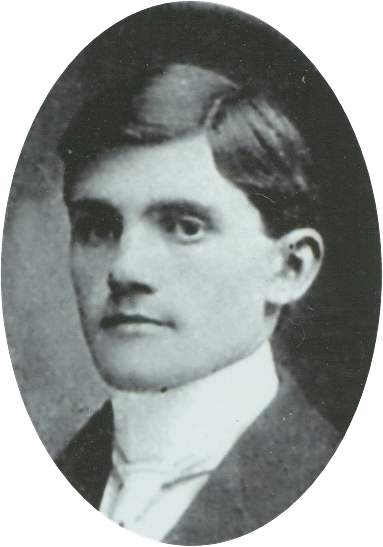
R. H. Boll
This is a key article for understanding Boll. From this important article Boll laid the ground work for pursuing his prophetic studies: it was necessary for growth in the word, for motivation in Christian living, and for submission to the will of God as it unfolded in the present reality.
In another article appearing in the Leader, Boll said that the return of Christ was one of the blessings promised by Peter as he preached at Solomon’s porch (Acts 3). "The two other blessings of their repentance would be: Seasons of refreshing from the presence of the Lord; and the coming of Christ - their great Messiah who was appointed for the people of Israel. Had Israel repented nationally, even then, Christ would have come and fulfilled all their glorious expectations which the prophets had kindled in their hearts." (Boll, Acts, 1). Boll affirmed that Peter’s reference to the second coming was a motive to repentance on the part of his listeners. "The particular point in which the inducement lay was this, that upon the Lord’s return the great “restoration of all things whereof God spake by the mouth of his holy prophets that have been of old” should take place." (Ibid.). But the distinction Boll was making was that the “times of restoration” would accompany the Lord’s return, not precede it. Otherwise the return of Jesus would not be a motivation for repentance on the part of Israel. "The word “until” limits the Lord’s sojourn in heaven. He stays there until the times of restoration - not during the times of restoration, not until after, but until those times, until the day the earth’s grand jubilee shall break." (Ibid.). Boll said that passages from the prophets (Isa. 11; 35; 65. etc.) and New Testament passages (Rom. 8:18-25; Rev. 20:1-6) were pictures of what that “grand jubilee” would be like. Boll then quoted Lipscomb as proof of his position regarding the “times of restoration.”(Lipscomb, Restoration, 360).
This article is important in understanding Boll’s methodology. He utilized the book of Acts, the most important book in Restoration studies. He tied the Lord’s return to Israel’s repentance. Revelation 20 was now attached to Acts 3:19,20. And he equated his position with that of Lipscomb. But there were features of Boll’s position which Lipscomb had not elaborated on. Lipscomb’s article did not mention a “national repentance of Israel.” Also it made no reference to Revelation 20 with “the times of restoration.” Boll had incorporated major features of dispensational premillennialism into the view he had received from Lipscomb.
Thad Hutson was an early opponent of the millennial teachings proposed by Charles Neal, a writer in Boll’s paper Word and Work. Hutson and Neal engaged in a 15 month exchange of articles in the Leader discussing features of the millennium as taught in Neal’s small book, Lessons on the Kingdom.(Neal, 3). Neal and Hutson mostly argue past each other but the importance of Hutson’s opposition lay in the fact that it was early, before the full fledged battle of the thirties, and that Hutson believed Neal added features which had not been elaborated on by previous Restoration teaching on the millennium: two resurrections, a literal thousand years’ reign, the return of the Jews to Palestine, etc. "Hence all this twaddle about two literal resurrections and a thousand years of a personal reign of Christ on earth is based on what the Scripture does not say." (Hutson, 1914, 9).
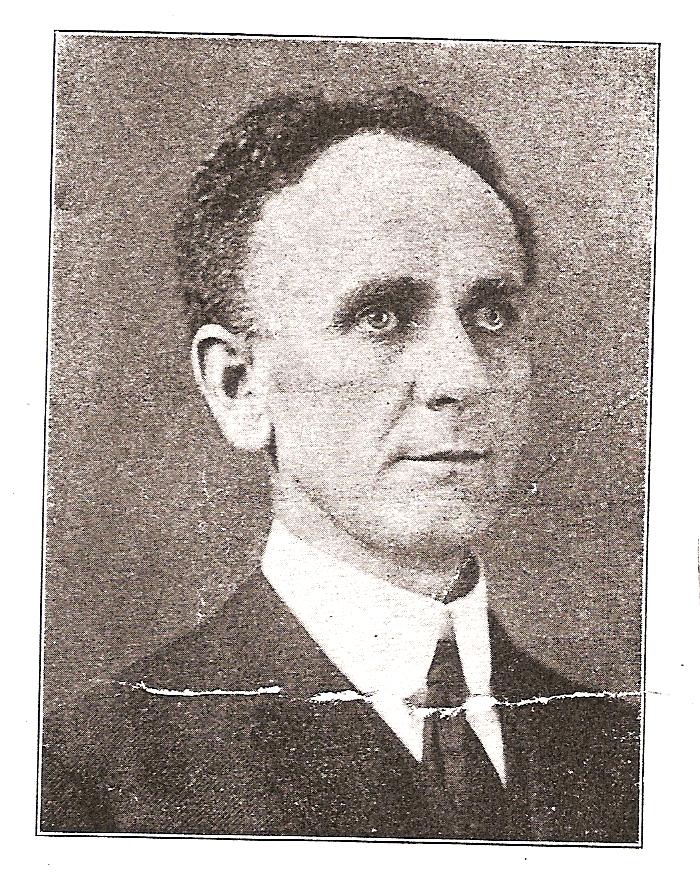
Thad Hutson
Ira Moore affirmed his belief in the return of Christ, but denied that he was to come and reign as an earthly king as taught by Boll. Boll’s theory, that the kingdom prophesied by Daniel had not yet been set up, misunderstood the nature of the rule of Christ according to Moore. Moore countered, "It is a clear, complete and unreasonable reversal of a government and citizens thereof to say that the citizenship has been established, but that the government has not yet become a reality, and will not until Jesus comes again." (Moore, Report, 4). Moore pointed out that David’s prophecy (Ps. 110:1-3) spoke of the willing offering of Christ’s subjects to his rule. To Moore, this implied that “at no time, either now or in the future, will Christ conquer any one and bring him into submission and service by the exercise of any other than moral or spiritual persuasive power.” As further prophetic proof of Christ’s reign, Moore turned to the imagery of the Priest-King (Zech. 6:13). Christ held the two offices of King and Priest at the same time. Moore pressed the point, “And he who admits that Christ is now Priest, must also admit that he is King.”(Ibid.). Moore seemed to be more concerned with Boll’s doctrine as it pertained to Christ’s rule rather than what it said about the Church.
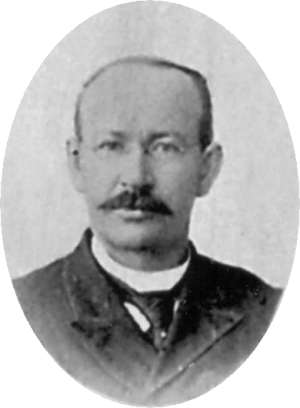
Ira C. Moore
As the controversy progressed, T. Q. Martin noted tendencies exhibited by the men in Boll’s camp. Martin said, “One of the greatest dangers to which a preacher or writer is subjected, is that of becoming wedded to a theory, and then persuading himself that he finds that theory in almost every chapter in the old book.”(Martin, Follow, 5). After giving a recent example from Word and Work, Martin said that in an age of “wild exegesis” some were making “wilder and wilder guesses” in dealing with God’s word, but not wanting to be questioned about their views. When questioned, the premillennial defenders would say, “You do not believe in the second coming” or “the church has lost her belief in the return of her Lord.” Martin denied that claim as he asserted, “I believe there is a general, almost universal agreement among professed Christians that Jesus is coming again.” Martin said that instead of troubling others over “guesses about things not clearly revealed” Christians should emphasize the truth of Jesus’ coming and being ready for it.
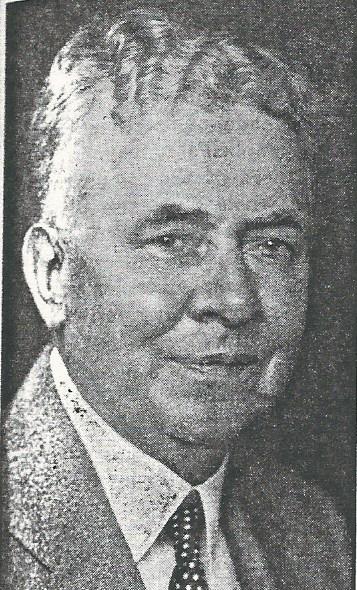
T. Q. Martin
When C. R. Nichol and R. L. Whiteside published a review of R. H. Boll’s teaching in a little booklet entitled Christ and His Kingdom,(Debate, 7). Thad Hutson heartily endorsed its appearing: "I have read carefully R. H. Boll on the coming of Christ and the coming Kingdom. But, oh boys, you should read the review of it, by Bros. Whiteside and Nichols (sic), both of Texas . . . Bros. Whiteside and Nichols (sic) have done the cause of truth a great good in this review. It encourages me greatly. May God speed it." (Hutson, Commendation, 9).Another endorsement of the booklet said that Boll’s theories could no longer be looked at as “speculations” or “harmless guesses.” The anonymous paragraph stated, “It is a violent wrestling of prophecies from their proper setting and fulfillment to make them do service in some fantastic dream of the future.” (Theories, 2).
In 1933 Foy E. Wallace, Jr. accepted Charles Neal’s challenge to debate in Winchester, Kentucky. The Leader gave ample space to the reporting of the debate.(Baumer, 8 and Hutson Millennium, 10-11). The proposition for the debate was: “The Bible clearly teaches that after the second coming of Christ, and before the final resurrection and judgement, there will be an age or dispensation of one thousand years, during which Christ will reign on the earth.” Neal affirmed the proposition and Wallace denied it. Later, both men would meet again in debate in Chattanooga, Tennessee. When the debate came out in book form as published by the Gospel Advocate, Ira Moore gave it a review: "The speakers were pretty evenly matched in several particulars, pleasant and smooth speakers and interesting. Our candid judgement is, based upon much reading and studying of the Scriptures and all I could get to read on the theme involved, that Bro. Neal undertook a most unusual and untenable task, but if anyone in the Brotherhood can defend that proposition and make it “stick,” he can. But Bro. Wallace showed himself equal to every occasion and need, and, as we candidly think, fully and fairly met and defeated his respondent on everything that pertained to the proposition and met some emergencies that did not." (Moore, 4).
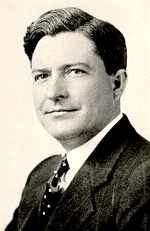
Foy E. Wallace, jr.
The debate pushed Foy E. Wallace, Jr. to the forefront in opposing premillennialism. When Wallace began the Gospel Guardian to counter the teaching propagated by Word and Work, F. L. Rowe encouraged writers to send their articles on premillennialism to Wallace for publication. (Rowe, Guardian, 9). For some time Rowe had been urging the publication of a brotherhood quarterly that would discuss controversial subjects aimed for preachers and allow papers like the Leader to be more suited for edification purposes of average members.
Though Fred Rowe had invited R. H. Boll to take a place on the Leader staff, opposition to the premillennial teachings of Boll and others was present in the Leader from the beginning of the period being studied. Thad Hutson, Ira Moore, and T. Q. Martin, along with many others, challenged the details of premillennial theories while they defended their belief in the return of Christ.
But the premillennial controversy exposed a division within the Leader regarding the issue. Despite the opposition of Hutson, Martin, Moore, and Rowe to Boll’s theories, Flavil Hall and Ben Elston became apologists for Boll and others to hold their opinions on the subject without them being a barrier to fellowship. Hall and Elston had both contributed to Word and Work when it was published out of New Orleans by Stanford Chambers. It is this writer's opinion that both men's personal ties to Chambers, Boll, and Neal were additional factors in their defense of the premillennialists. Elston had baptized Charles M. Neal and considered him his "true child in the faith."
Was Hall a premillennialist? In 1920, Hall gave a quasi creedal statement on what he believed. "I preach that the church is the kingdom, and vice versa; that it takes Christ, as head of the church, to complete it, and the members of the church, the subjects ruled, to complete the kingdom, of which Christ is King; that “the church of the firstborn” in Heb. 12:23 is called the immovable kingdom in verse 28; that this divine government was “set up” on the first Pentecost after the resurrection of Christ; that it is composed of all baptized, penitent believers, wherever they may be; that such believers who are in any religious organization that is smaller than all such believers, and larger than a local congregation of worshipers, should sever their connection with it and declare themselves only members of the “church of the first born,” to which the Lord added them in their faith and baptism (Mark 16:16; Acts 2:47), and that all Christians should practice in their work and worship only what is taught specifically or by implication in the Scriptures of the new covenant." (Hall, Pioneers, 6). Hall later said, “I do not believe the theories of some brethren on the kingdom and prophecy, but it would be wicked in me to denounce those brethren as unworthy because of this.” (Hall, Blacklisting, 6).
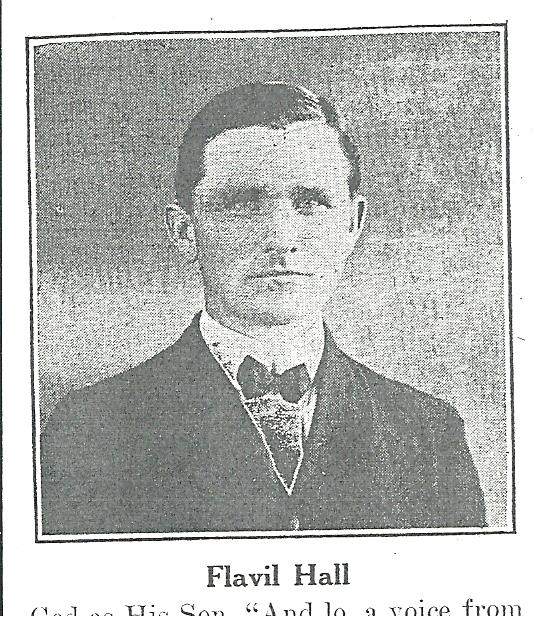
In addition to this statement, it should be noted that Hall never wrote on the subject in the pages of the Leader even though he was willing to enter into controversy on other subjects. Hall had three songs in Jesus in Song which have the theme of the second coming of Christ, but none of the songs speak of a millennial reign, an earthly kingdom, or other features of premillennialism. While the other Leader editors and writers took him to task for his defense of the premillennialists, they never accused him of holding premillennialist views. In the midst of the strained relations that were brewing on the Leader staff, Thad Hutson gave this endorsement of Hall: "Some brethren may not be able to agree with him in every thing, but he is an able and earnest brother, and is laboring in a difficult field. I love him for the work’s sake, and because I take him to be a true and conscientious brother and friend in the Lord. I do not believe matters of opinion should hinder our love, nor obstruct our unity. If I understand, then this is Bro. Flavil’s position." (Hutson, 1932, 1). In a letter written in 2004, Hall's grandson confirmed that his grandfather was sympathetic to those who held the view, but did not preach it. "I am confident he never preached premillennialism to the Awin (AL) church." (Bill Hall).
Hall did not hold pre-millennial views, but he defended Boll’s right to them: "I do not think the editor of Word and Work has changed in his views very radically since he began writing for the Gospel Advocate, not less than twenty years ago. His writings were then tinged with the imminent coming of Christ idea, and if it was not pernicious then, it is not now; and if it was not pernicious for Bro. John T. Poe to take the position that the kingdom is yet to be established, it is not pernicious for another brother to take the same position, if he try not to build a party on this and kindred ideas." (Hall, Combine, 6). Hall’s defense of the right to opinion was fixed to three ideas: 1) individuals had liberty to hold differences on matters that did not interfere with faith, obedience, and Christian living; 2) people in the past had held similar positions yet were esteemed, not condemned; 3) if readers were going to condemn those whose opinions differed, then consistency demanded they oppose all whose opinions were different, not just premillennialists. Time and again Hall brought up the names of the past, who in his judgement, held positions similar to Boll. J. A. Harding, T. W. Brents, Alexander Campbell, Robert Milligan, and J. W. McGarvey were among the names Hall dropped before his readers to stir their minds to see the inconsistency being practiced toward Boll. (Hall, 1932, 6).
But R. N. Moody saw a difference between the millennial teachings of Campbell and Brents and what he was currently reading. “Yes, Brother Campbell, Dr. Brents, and others preached and wrote on the millenium, but they made no effort to build up a faction on their ideas about it.” (Moody, 5).
As time passed Hall’s fellow editors grew tired of his defense of Boll and others in Louisville. T. Q. Martin took Hall to task for raising a false issue on the matter. "I do not know of any preacher of the gospel who questions any man’s right to “have an idea or two” on any subject. The right to “have an idea or two,” to hold an opinion, and to disturb congregations by preaching “the idea or two,” or the opinion is altogether a different thing." (Martin, Blacklisting, 5).
Ira Moore also had problems with Hall’s continued defense of the Word and Work editors. Moore stated: "We think it is time for Bro. Hall to cease his unprofitable defense of the heretical teaching of such men and turn his attention to a more honorable and profitable matter. Some who were once his ardent admirers have ceased to read his unmanly complainings. And we think the space in the Leader can be devoted to more profitable matter than to the defense of “Blowhard Norris” and C. M. Neal et al, of like faith." (Moore, Defense, 5). Hall responded to Moore by stating that he was not trying to cover the errors of the premillennialists. He believed that misleading and misrepresentation of the positions of others was occurring in the discussion and he sought to correct these injustices.(Hall, 1935, 11). Ira Moore added some comments to Hall’s column: "It will be hard for Bro. Flavil Hall to convince the readers that he has not been by constant innuendo, insinuations and open defense, trying to keep the Premillennial propagandists and dividers of churches undercover;" (Moore, Notes, 11). For Moore, the real problem of the premillennialists, was the discord and disharmony their views were causing. Moore could not believe that Hall continued to defend the Word and Work editors over something they admitted was a “nonessential.” Moore said, "It would be far more to their credit to regard their teaching on the millennium as absolutely essential to a successful Christian life, than to proclaim it a nonessential, yet push it to the disruption of fellowship and peace. And Bro. Hall would be engaged in a far more commendable effort were he using his excellent abilities to induce them to cease their contention and return to sanity and Christian consistency." Hall and Elston’s defense of the premillennialists led to their removal from the Leader masthead and estrangement from the paper in 1935. Hall and Elston were a microcosm of the problem that faced J. N. Armstrong at Harding College. Armstrong sought to give his position in several articles that appeared in the Christian Leader. (Armstrong, Thousand, 1, et al.). The Leader also carried Wallace's rebuttal to Armstrong's arguments. (Wallace, 6). H. Leo Boles gave a truly insightful article in the Gospel Guardian. (Boles, 5).
In closing this section of the study, some observations are in order. First, eschatology and studies in prophecy were among the weakest points in Restoration scholarship. R. H. Boll was the price paid for that weakness. Ignoring any section of Scripture or skipping over Biblical subjects is to invite a repeat of those unfortunate events.
Second, much of what was said in the period must be kept in context. It was a highly speculative time period. This was the era of Charles T. Russell and the Scofield Bible. It was a catastrophic time period. Deaths numbering in the millions from World War I, the influenza epidemics, and the Russian revolution all fed apocalyptic imaginations. Though it has been largely forgotten, many Restoration preachers in the period offered their guesses as to how all those events fit into the book of Revelation. Those guesses were wrong. But it is easy to pass judgement on their writings with the perspective of 75 to 80 years after the events. Their mistakes should give Bible students today a strong dose of humility. How many of our interpretations will be judged as mistaken eighty years from now?
Third, historians have been selective with the character of Fred Rowe. Michael Casey, Robert Hooper, as well as Richard Hughes, have all cited Rowe’s letter to J. Edward Meixner to bolster the case for evidence of Rowe’s opposition to the tactics of Wallace and those with him, i.e. the Texas tradition.(Casey, 55; Hooper, 155-56; Hughes, 183-84). Rowe wrote to Meixner: "I am glad to have you express yourself regarding the tactics of Brother Wallace. I don’t know what in the world he hopes to accomplish by circulating such stuff among the brethren. It only serves to imbitter [sic] good brethren instead of trying to bring them together. One of their group of writers held a meeting in my home church. He preached four very forceful sermons, largely pugnacious, and I asked him at the supper table to preach a sermon on the Prodigal Son. He hesitated a minute and then said, “Brother Rowe, I cannot do it, I have never studied that subject.” (Rowe).
Rowe’s letter in 1939 voiced his opposition to the tactics of Wallace. But Rowe had used the same tactics himself earlier in the premillennial controversy. Rowe led the way in publicly “listing the Bollites.”(Rowe, List, 5). He published a paragraph from a Gospel Advocate article by Foy Wallace which listed six writers for Word and Work as the “sect that had emerged.”(Wallace, GA). Rowe added this to the excerpt: "It is not only important to have the name of the generalissimo but all the lieutenants, majors, corporals and on down to the first privates. Such a list should be published for the protection of churches over the country."(Rowe, List, 5). Rowe followed this up several months later as he sought to put an end to the premillennial controversy in the Leader. Rowe said, "Instead of taking up valuable space in our papers, let us simply compile a list of those preachers who are know to be out-and-out Bollites. The Leader will be glad to print such a list and add to it from time to time as others are discovered."(Rowe, Short, 6). When some objections were raised to this tactic, Rowe defended his action, not as denying the liberty to hold an opinion, but as a way of marking those who were dividing the fellowship. Rowe wrote, "But our list would included those who are openly defending and teaching this doctrine and are causing division in the body of Christ. And I still think the Holy Spirit specifically instructs us to mark such and have no fellowship with such." (Rowe, Cut, 5). Rowe appealed to Romans 16:17 for defense of his actions. He went on to say: "The word “division” as used in this verse means “parties” or “factions.” And if Bollism has not produced both, then some of us are dumb. If Bollism has developed parties or factions and divisions (and I know it has) then we are commanded to avoid them." (Ibid.). Rowe went on in the article to list 11 men associated with Boll. He also said that about 25 more names could be added to the list if one went through the pages of Word and Work. Rowe used this article to close discussion on the pre-millennial issue in the Leader, believing he had completed his task on the subject. As evidence of Rowe’s willingness to follow through on his “listing the Bollites,” Ben Elston and Flavil Hall were removed from the Leader.
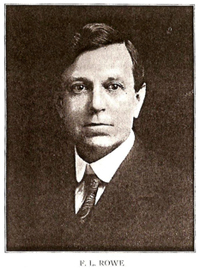
Rowe’s inconsistency has been overlooked by the historians. He seems to have had his convictions determined by whose company he kept, which was a major character flaw in the enigmatic Rowe. In earlier years, Rowe had been friends with many of the men in Louisville, since they often came to help with the re-establishment of the Church in Cincinnati. Rowe had been the one who invited Boll to the front page of the Leader when his problems began with the Advocate. As the premillennial controversy became heated, however, Rowe was at the forefront calling for their ostracism. Rowe’s distaste for the controversy even led him to wish for a publisher to publish a Bible without the book of Revelation.(Rowe, Revelation), 3). This was a statement Rowe regretted making, especially when the Louisville men made their most of it. (Rowe, On, 18). But by the end of the thirties, Rowe had come full circle. He promoted the unity initiative of Murch and Witty, which was staunchly opposed by Wallace, but supported by the editors of Word and Work. (Murch, 129).
Robert Boll transformed the millennial eschatology he had received from Harding and Lipscomb. In the controversy which ensued, it is too bad that Boll did not pursue what David Lipscomb had said about unity and opinions with as much diligence as he pursued the future return of Christ. "If one man’s opinion is ground for action in church affairs, another man’s is likewise, and every man’s is. As we differ in opinion, then we must adopt diverse and different rules of action. And different rules of action in a church will bring conflict in action. It will necessarily produce strife and confusion and lead to division. It cannot possibly be avoided." (Lipscomb, 11).
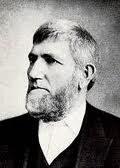
Works Cited
Armstrong, J. N. "A Thousand Years" Christian Leader 30 (Mar. 7, 1916):1.
_________. "The Living Message" Christian Leader 38 (Nov. 18, 1924):3.
_________. "A College President Goes on Record Again" Christian Leader 49 (Jan. 8, 1935):2.
_________. "For Good Understanding" Christian Leader 49 (Apr. 30, 1935):4.
Baumer, M. D. "The Wallace-Neal Debate" Christian Leader 47 (Jan. 10, 1933):8.
Boles, H. Leo. "The Issue Now - And Then" Gospel Guardian 1 (Oct. 1935):5.
Boll, R. H. "The Place and Importance of Prophetic Teaching" Christian Leader 29 (Dec. 21, 1915):1.
________. "On the Book of Acts" Christian Leader 30 (Oct. 17, 1916):1.
Casey, Michael. Saddlebags, City Streets, & Cyberspace. Abilene: ACU Press, 1995.
"Debate on the Kingdom" Christian Leader 39 (May 12, 1925):7.
Bill Hall, Alabama to Bruce Daugherty, Ohio, Jul. 7, 2004.
Hall, Flavil J. "Field Notes and Helpful Thoughts - The Pioneers" Christian Leader 34 (Nov. 16, 1920):6.
________. "Blacklisting Brethren" Christian Leader 37 (Oct. 30, 1923):6.
________. "Field Notes and Helpful Thoughts - Is it a Combine?" Christian Leader 34 (Aug. 31, 1920):6.
________. "Soulful, Hopeful, Helpful Thoughts" Christian Leader 46 (Dec. 13, 1932):5.
________. "Soulful, Hopeful, Helpful Thoughts" Christian Leader 49 (Jul. 23, 1935):11.
Hooper, Robert. A Distinct People. West Monroe, LA: Howard Publishing, 1992.
Hughes, Richard. Reviving the Ancient Faith. Grand Rapids: Eerdmans Publishing, 1996.
Hutson, Thad. "Considerations" Christian Leader 28 (Oct. 20, 1914):9.
________. "Commendation" Christian Leader 39 (Jun. 9, 1925):9.
________. "Considerations" Christian Leader 46 (Aug. 9, 1932):1.
________. "Millennium Debate" Christian Leader 47 (Jan. 24, 1933):10-11.
Lipscomb, David. "Restoration, Times of" in Queries and Answers, J.W. Shepherd, ed. Cincinnati: F. L. Rowe, Publisher, 5th ed. 1942: 360.
________. Christian Unity, How Promoted, How Destroyed, Faith and Opinion. Nashville: McQuiddy Publishing, 1916. reprint Faith and Facts Press.
Martin, T. Q. "Cannot Follow Implicitly" Christian Leader 46 (Jun. 28, 1932):5.
________. "Bro. Hall on Blacklisting" Christian Leader 37 (Nov. 13, 1923):5.
Moody, R. N. "Brother Moody Speaks Out" Christian Leader 47 (Jan. 10, 1933):5.
Moore, Ira C. "Editorial Brevities and Comments" Christian Leader 29 (Oct. 5, 1915): 8.
________. "Editorial Views and Reviews - The Report About Harding College" Christian Leader 38 (Nov. 18, 1924):4.
________. "The Neal-Wallace Debate" Christian Leader 38 (Mar. 6, 1934):4.
________. "Bro. Hall's Defense of C. M. Neal and Other Premillennialists" Christian Leader 49 (Jul. 9, 1935):5.
________. "Editorial Notes" Christian Leader 49 (Jul. 23, 1935):11.
Murch, James DeForest. Adventuring for Christ in Changing Times, An Autobiography of James DeForest Murch. Louisville: Restoration Press, 1973.
Neal, Charles. "Considerations Considered" Christian Leader 29 (Jan. 26, 1915):3.
Rowe, Fred. "The 'Guardian' Features It" Christian Leader 40 (Feb. 4, 1936):9.
________. "Better List All of Them" Christian Leader 48 (Aug. 21, 1934):5.
________. "A Short Cut" Christian Leader 49 (Apr. 30, 1935):6.
________. "That Short Cut" Christian Leader 49 (May 28, 1935):5.
________. "Church Enemy No. 1" Christian Leader 49 (May28, 1935):5.
________. "Strange Bedfellows" Christian Leader 49 (Oct. 29, 1935):7.
________. "How Revelation Impresses Me" Christian Leader 47 (May 16, 1933):3.
________. "Rowe on Revelation" Christian Leader 49 (Nov. 12, 1935):18.
Rowe, Fred L. Cincinnati, to J. Edward Meixner, Pittsburgh, Jun. 23, 1939. Center for Restoration Studies, Abilene Christian University, Abilene, TX.
"Theories Vs. Truth" Christian Leader 39 (Jun. 30, 1925):2.
Wallace, Foy E. "Brother Armstrong's Way to Unity and Good Fellowship" Christian Leader 49 (Apr. 2, 1935):6.
________. "The Sect Has Emerged" Gospel Advocate (Aug. 9, 1934).
